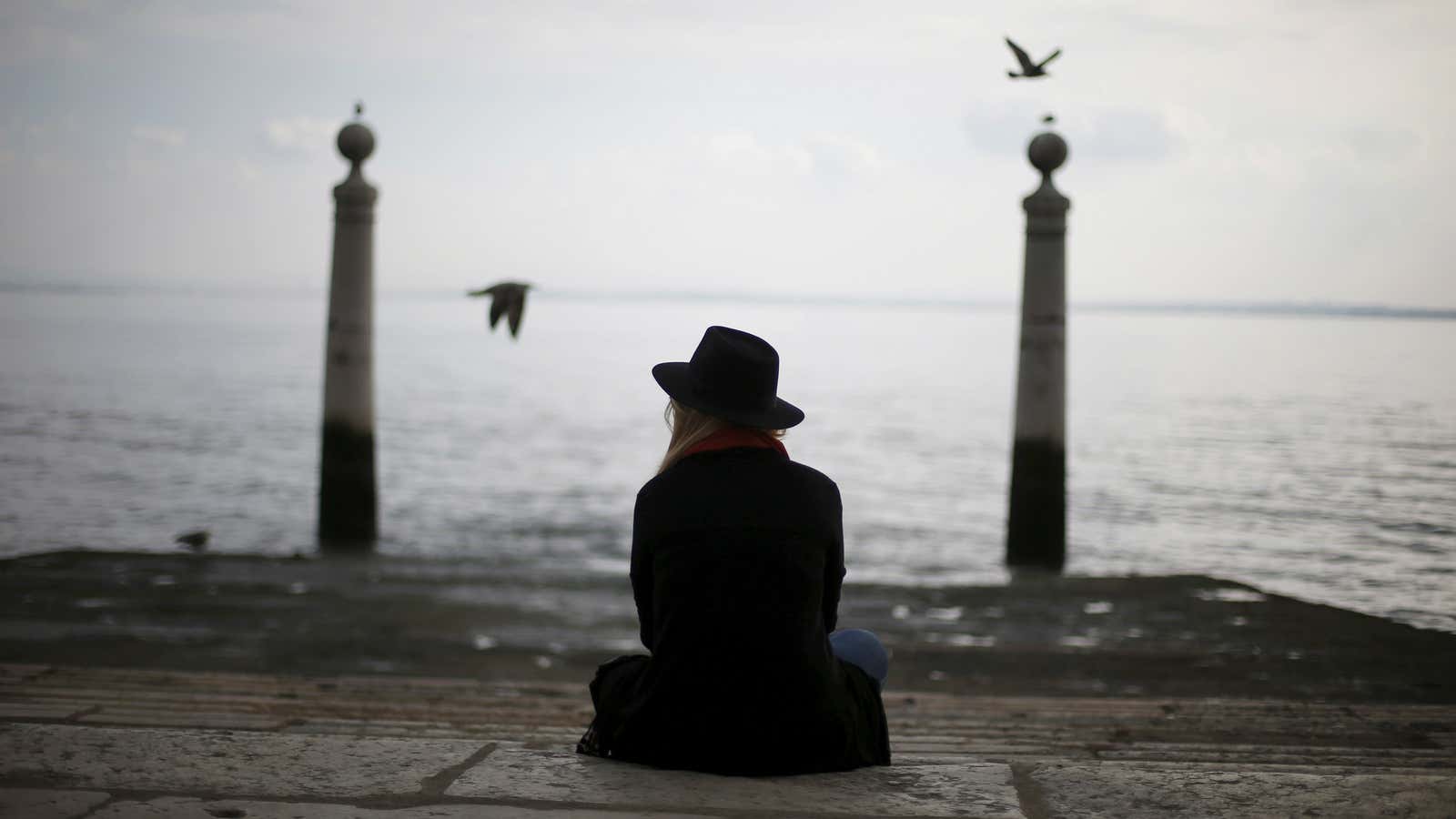Slurping ramen at a noodle bar, contemplatively sipping a coffee at a sidewalk cafe, or wandering through a sprawling street market. These are activities that are so stimulating to the senses when traveling, they hardly require a companion to be enjoyed. And yet, so many travelers wait on booking their dream trip because they don’t have the right person to go with.
That’s a mistake, at least according to Stephanie Rosenbloom, a New York Times travel journalist and the author of the new book Alone Time: Four Seasons, Four Cities, and the Pleasures of Solitude. ”When you’re not sitting across from someone, you’re sitting across from the world,” writes Rosenbloom [paywall], who spent time in Istanbul, Paris, Florence, and New York as a solo traveler while writing her book. She said her hope is to inspire readers to turn would-be dream trips into actual itineraries.
“I really wanted to write something which gave people permission to not wait for the perfect moment, or wait until their schedule aligns with their best friend’s, or until they meet the love of their life,” Rosenbloom said.
Solo travel, by all accounts, is on the rise. Adam Cooper, president of millennial-focused travel company Contiki, says that by the end of this year, three quarters of the travelers the company is leading on trips out of the US will be solo wanderers, and other companies report similar numbers. Their most popular trip with solo travelers is a 13 day, nine country European tour, which he says allows travelers the “shared experience of being with a group of people” but also the freedom and time to explore alone.
But it’s not just the experience-hungry millennials that are into the trend. Peggy Goldman is the founder and president of Friendly Planet Travel, a travel company she founded in 1981 that predominately serves baby boomers. She says this category has grown tremendously since founding her company, with the idea of going on a trip alone become much more accepted.
“We have lots of single travelers who have spouses or lifetime relationships and one person doesn’t want to travel and the other person does,” Goldman said. “So where it used to be an anomaly, in today’s world it’s possible to say ‘I’m gonna go by myself’ and no one thinks anything of it.”
With companies like Contiki and Friendly Planet offering smaller group tours—these are not 40 person bus trips—a solo traveler gets the best of both worlds: conversation when they want it, and solo time when they don’t. But Rosenbloom says that even if you go it totally alone, it’s a huge misconception that a solo trip means you won’t talk to another soul during your time away. And, if you choose to stay in a hotel—something she recommends for first-time solo trippers, as the service element can provide comfort, safety, and a bit of advice—you might find you make more friends than you anticipate.
“Nowadays hotels are really souping up their lobbies—especially with the rise of co-working—everybody really wants to have these communal spaces,” Rosenbloom says. “People often are more friendly to others when they’re by themselves so it’s a great opportunity to meet people, especially if you put yourself in an environment where there are communal spaces.”
So what’s the biggest hurdle for solo adventurers? The first assumption may be that aforementioned aspect of safety, but Rosenbloom responds to that by saying one’s sense of safety will vary widely based on how experienced they are as a traveler, and of course where they travel to. Much more of a hurdle, says Goldman, is price. For years, hotels have charged solo travelers the same price for a room as a pair of travelers, meaning that a standard room fare “ends up looking like a penalty to a single traveler.” A recent report from UK based currency exchange service FairFX found that single parents in the UK are being charged as much as £500 ($667) more than those traveling as a couple on holiday.
While companies like Goldman’s try to negotiate on behalf of their clients—to avoid making adults share rooms with strangers to save money—those who book on their own have historically overpaid. However, with the rise of home-sharing and the new crop of luxury hostels, single travelers have caught a break, as those options tend to cater to solo travelers’ budgets.
In addition, Rosenbloom advises seeking out upscale hotels, particularly in Europe, that offer single rooms, such as the Hoxton Hotel’s “Shoebox” rooms in London, Amsterdam, and Paris. Often these are not prominently advertised on booking sites or online travel agencies, though, so booking direct through a hotel’s website may be necessary.
And the biggest upside of traveling alone? To drink in the solitude and revel in the serendipity that unfolds, particularly in places like the pedestrianized locales Rosenbloom visited. She says her book was motivated as much by her interest in why solitude is important for humans as it was how to plan a good trip. While the idea of eating alone or attending a show without someone sitting next to you may sound intimidating, she offers that it could not only enrich your trip—but your understanding of yourself, too.
